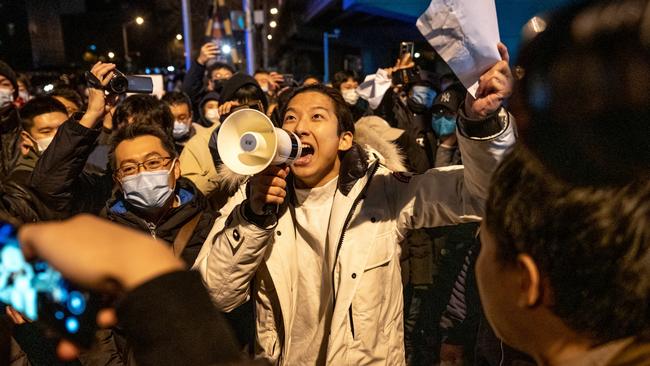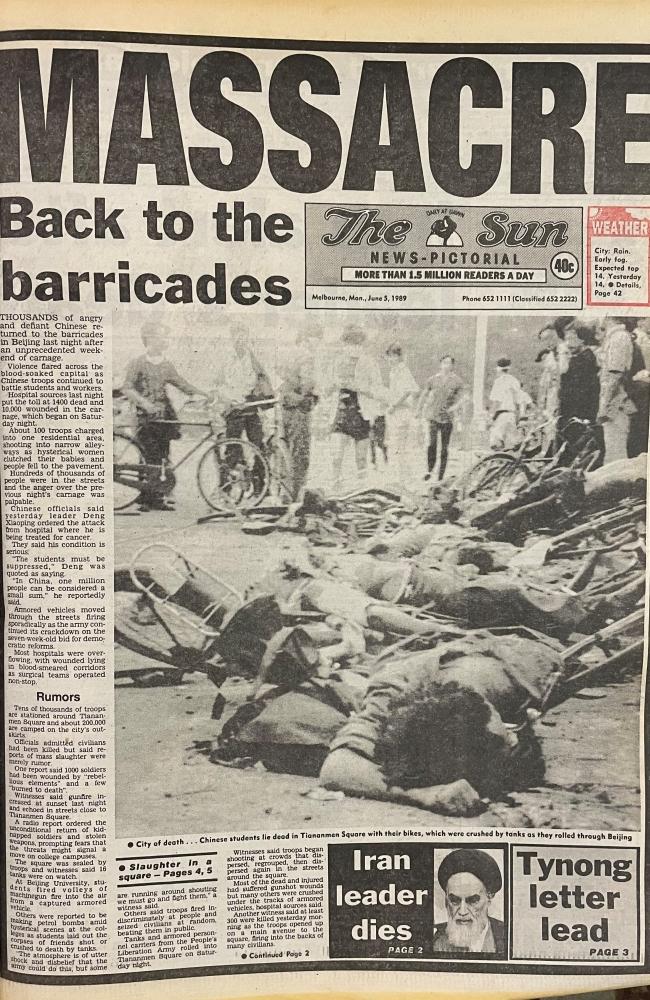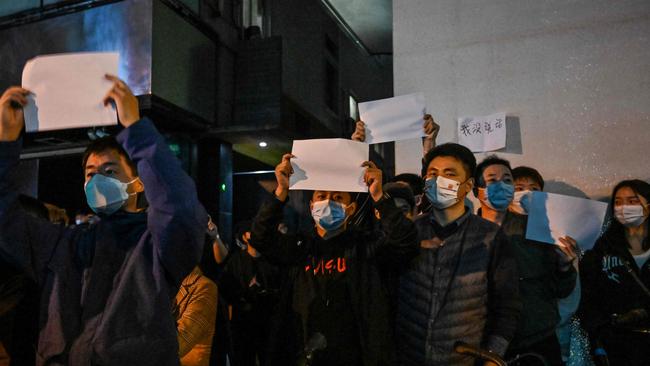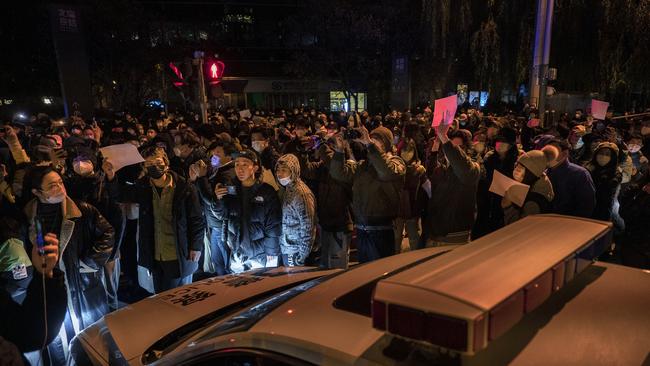Young Chinese nationals lead anti-communist protests
“We want freedom! We want human rights!” they chanted into the early hours of Monday morning, surrounded by police.

“We want freedom! We want human rights!” they chanted into the early hours of Monday morning, surrounded by police.
Crowds chanted “down with the Communist Party” and “Xi Jinping, step down”, and a BBC journalist has been arrested, beaten, and kicked by Chinese police, in an extraordinary wave of protests across China sparked by anger at draconian Covid restrictions.
The anti-government protests on a scale not seen since 1989’s Tiananmen massacre broke out on Saturday in cities including Xi’an, Nanjing, and Shanghai, three of China’s most politically influential cities, surging into Beijing on Sunday. Most of the protesters are young urban residents, although some older citizens have joined them.

China’s eruption of dissent was triggered by the deaths of 20 people, including three children, in a fire in an apartment block in Urumqi on Thursday night. Many residents linked the tragedy to Xi’s signature “dynamic zero Covid” policy, which they believe stopped victims from escaping the flames, although Chinese authorities deny this.
"Down with the Communist party” an angry crowd chanted on Saturday night in Shanghai, a city of more than 25 million people that was brutally locked down for three months earlier in the year."
Chilling. The national anthem. Especially that phrase ‘qi lai!’ (‘stand up!’). Never seen anything like this. Well, except in #HongKong… pic.twitter.com/OGYZwNgnKi
— Eva Rammeloo (@eefjerammeloo) November 26, 2022
The protesters sang China’s national anthem and held up sheets of blank white paper, a popular symbol of resistance in China where posting anti-government slogans online or displaying them in public can result in swift arrest.
Other protesters were shockingly blunt, even as they were surrounded by large numbers of police. “Xi Jinping, step down” some shouted. Others called out “We want freedom” and “Xinjiang, end lockdown”.
On Sunday, a group of protesters returned to the site of a Saturday night protest to hold a vigil to mark the death of those in the Urumqi fire. The police presence was aggressive, and BBC journalist Ed Lawrence was roughed up, handcuffed, and detained by Shanghai police while covering the protest.
Chinese authorities told the BBC they arrested Lawrence for his own good, “in case he caught Covid from the crowd,” according to the BBC, which they did not consider a "credible explanation".
Although he was released after several hours, the BBC said it was “extremely concerned” about his treatment, as Lawrence was in the middle of “carrying out his duties”.
In Nanjing, China’s republican capital before the communists took power, hundreds of university students gathered at a night-time vigil on Saturday, shining the lights on their smartphones in unison.

Another group of students protested in Xi’an, a former imperial Chinese capital.
The largest crowds gathered in Urumqi in Xinjiang where thousands resisted police as they demanded “end the lockdown” and shouted, “I don’t have money to feed myself.”
On Sunday afternoon, hundreds of protesters gathered at Tsinghua University, the prestigious institution in Beijing where President Xi studied Marxist theory.

At least another thousand people gathered on the south bank of Beijing’s Liangma river, near one of the capital’s diplomatic precincts. An old lady joined the crowd by, chanting with them: “liberate Beijing!”, “liberate China!” and “let the children go back to school!”
“We want freedom! We want human rights!” they chanted into the early hours of Monday morning, surrounded by a tremendous police presence, which grew as the demonstration continued.
130am in Beijing. Still going. Cries of “we want freedom, we want human rights†pic.twitter.com/k62Goloaof
— David Rennie 任大伟 (@DSORennie) November 27, 2022
The flood of anger online seemingly overwhelmed China’s formidable internet censorship regime over the weekend. Commenters shared stories of deaths and economic stress that have been linked to China’s heavy-handed Covid policy. Many online netizens vented after seeing videos of the World Cup in Qatar, where fans from around the globe are gathered without masks. That followed weeks of saturated Chinese media coverage of a maskless Xi in Bali and Bangkok, shaking hands with other world leaders.
Disturbingly for the Communist Party leadership, the spreading tumult follows weeks of riots across the country, including in Guangzhou in China’s south, Chongqing in China’s west, and Beijing.
“I’ve lived in China for 30 years, and I’ve never seen such a brazenly open and sustained expression of rage … This is a serious test of CCP governance,” said David Moser, the director of Chinese Studies at Beijing Capital Normal University.
Shouting “come down†to people in apartment buildings pic.twitter.com/qAmqAS3xW3
— Vivian Wang (@vwang3) November 27, 2022
Many in China had hoped that Xi’s recent re-election for an unprecedented third, five-year term as leader would lead to an easing of his stern Covid regime. Instead, new spartan quarantine centres – called “fangcang” (square cabin) – are being built across the country, as official case numbers reach record highs.
Last winter’s Covid outbreak in Hong Kong has influenced Beijing’s refusal to change course. The city had the highest mortality rate recorded in the developed world since vaccines became available.
Experts in Chinese politics warned the Communist Party would respond to the public outcry with a harsh crackdown.



